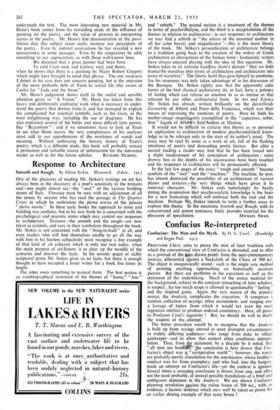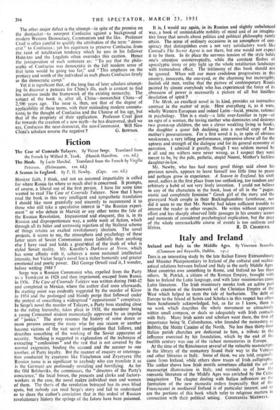Confucius Re-interpreted
Confucius: The Man and the Myth. By H. G. Creel. (Routledge and Kegan Paul. ass.) PROFESSOR CREEL aims to pierce the mist of later tradition with which the conventional view of Confucius is shrouded, and to offer us a portrait of the Man drawn purely from the near-contemporary sources, silhouetted aainst a 'backcloth of the China of 500 n.c. The object is unequivocally sound ; such is the single sure method of painting anything approaching an historically accurate picture. But there are problems in the execution as well as the statement of the undertaking. Much of the source material for the background, subject to the constant retouching of later scholars, is suspect ; far too much scope is allowed to questionable " feeling" and the inspired guess. Again, the very nature of the primary source, the Analects, complicates the execution. It comprises a random collection of sayings, often inconsistent, and ranging over a farrago of topics from which it would tax even the most ingenious intellect to produce ordered consistency. Here, all praise to Professor Creel's ingenuity ! But, we should do well to doubt the wisdom of the, attempt.
The better procedure would be to recognise that the Analect.c is built up from sayings uttered in most divergent circumstances, to widely differing audiences—who range from duke to village gatekeeper—and to allow that context often conditions interpre- tation. Thus, fronijk statement, by a disciple be it noted. that "all men are brotRW,' Ihe conclusion is here drawn that Con- fucius's object was "co-operative world " ; however, the words are probably merely consolation for the interlocutor, whose brother's conduct was far from exemplary, and who had, into the bargain. made an attempt on Confucius's life—yet the context is ignored. Several times a sweeping conclusion is drawn from one, and often not the most probable, of several possible translations of a brief and ambiguous statement in• the Analects. We are shown Confucius planning revolution Against the ruling house of 500 n.c., with, as evidence, a laconic sentence which may well be taken as praise for an earlier shining example of that same house !
The other major defect is the attempt—in spite of the promise on the dustjacket—to interpret Confucius against a background of modern Western Democracy, Communism and the like. Professor Creel is often careful to qualify the attribution of the term " demo- crat" to Confucius ; yet his eagerness to preserve Confucius from the „taint of totalitarian tendency which he sees in his folloVier HsOn-tzu and the Legalists often overrides this caution. Hence the juxtaposition of such sentences as: "To say that the philo- sophy of Confucius was democratic in the full modern sense of that -term would be going too far," and "This emphasis on the priMacy and worth of the individual as such places Confucius firmly in the democratic camp."
Yet it is significant that, of the long line of later scholars attempt- ing to discover a panacea for China's ills, each is content to find his solution inside the framework of the existing monarchy. The subject of the book is, after all, China—monarchist China—of 2,50() years ago. The issue is, then, not that of the degree of applicability of these terms, with their misleading modern connota- tionsklo the thought of Confucius and the Chinese of his ageibut that of the propriety of their application. Professor Creel goes far towards the creation of a new myth—he has discovered, shallave say, Confucius the near-democrat, the non-Communist. Will New
China's scholars reverse the negative ? G. BOWNAS.



































 Previous page
Previous page